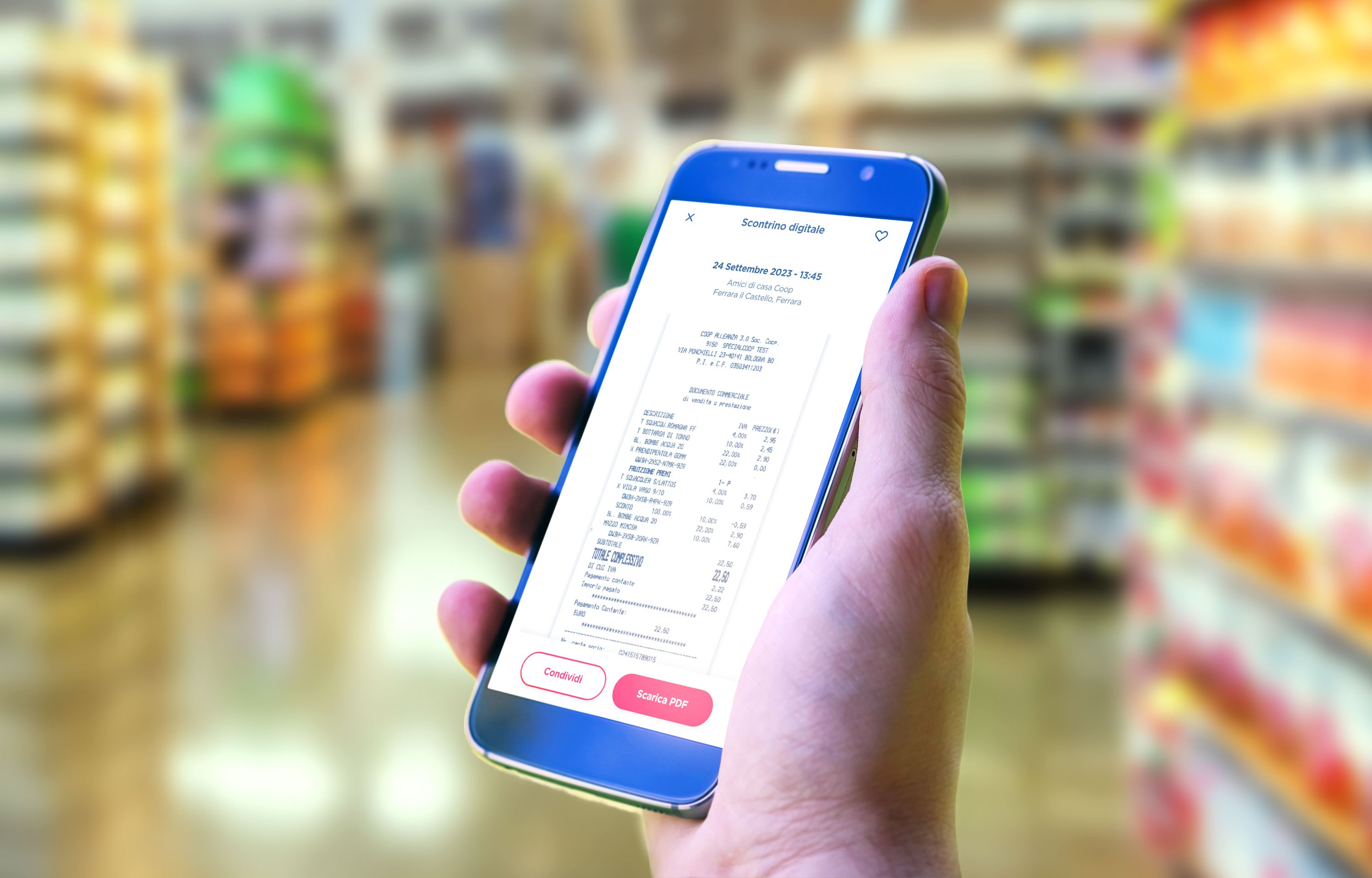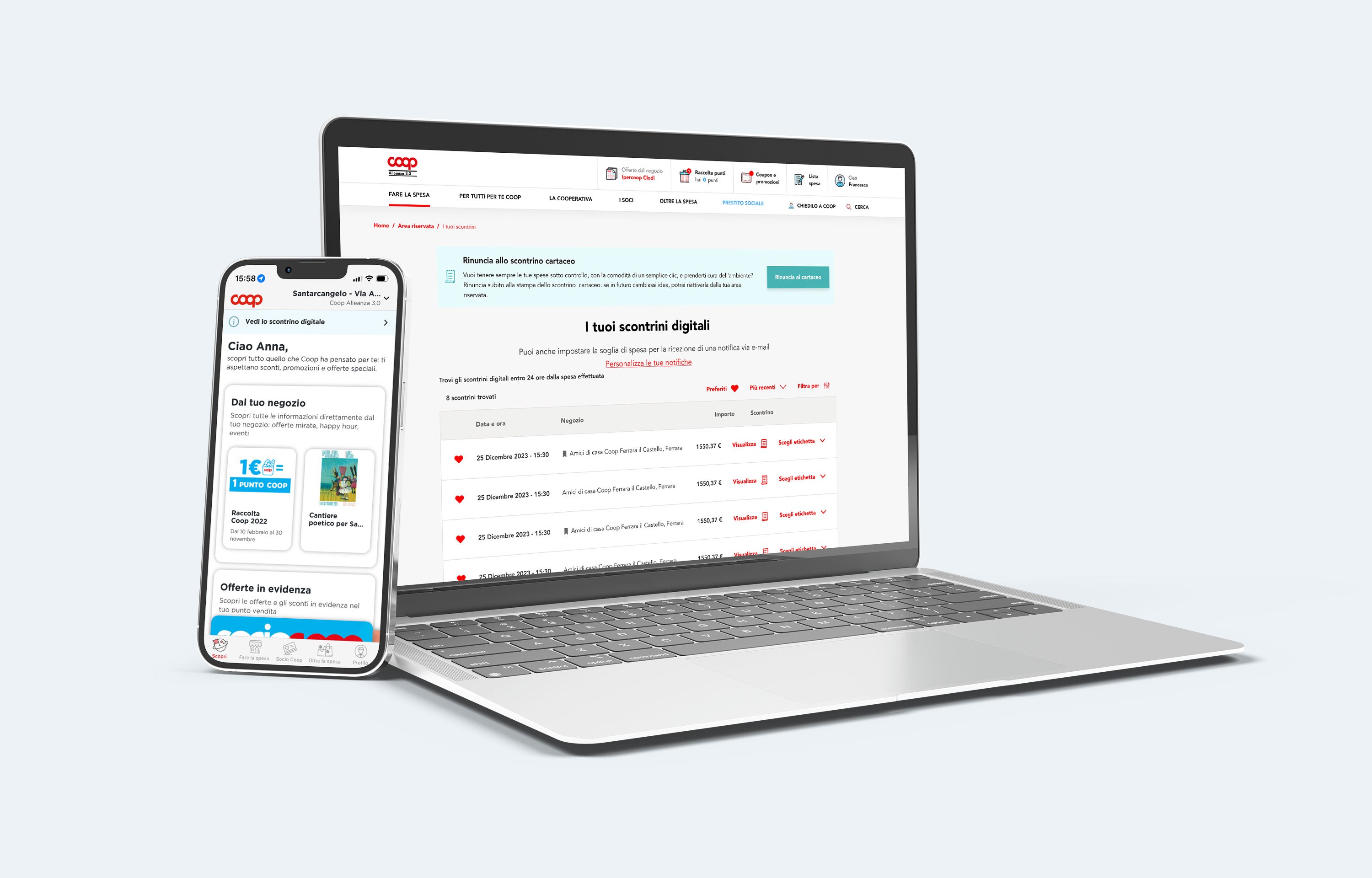Thinking
Lessons Learned: innovation and sustainability with Coop Alleanza 3.0
In our collaboration with Coop Alleanza 3.0, we embarked on a project to dematerialize receipts, aiming to reduce paper usage, enhance member services, and promote a more efficient and modern consumer experience.

Digital transformation in retail opens new horizons not only in terms of technological innovation but also in reflecting on how we can make digital more sustainable and responsible. The project to digitize receipts with Coop Alleanza 3.0 represents an exceptional opportunity to improve people's lives and protect the environment, adopting a user-centered and ecosystem-centered design approach aimed at meeting the real needs of consumers.
From User-Centered Design to Planet-Centered Design
In our design commitment, we have always placed the user at the center of the design process, carefully analyzing their interactions with technology to create intuitive and accessible experiences. In recent years, we have further elevated this vision by adopting a Planet-Centered Design approach, which expands our consideration from the end-user to the entire planet.
Our philosophy of responsible innovation guides us not to limit ourselves to meeting the immediate needs of users but to expand our vision to include the environmental impact of our solutions. It is essential that our products, in addition to effectively responding to user needs, actively contribute to the planet's sustainability.
The collaboration with Coop Alleanza 3.0 has been crucial in this evolutionary journey. Together, we ensured that our digital solution was not only intuitive and easily accessible but also designed with an eye toward environmental protection.
We refined every aspect of the digital experience, from consulting receipts to encouraging the adoption of the digital version, striving to offer a smooth and consistent user journey across all touchpoints.
An especially innovative element of our work was the synergistic integration between the website and the app, which allowed users to navigate seamlessly between different channels. This not only improved the service's accessibility and usability but also reduced environmental impact, promoting the adoption of an eco-sustainable digital solution.

Collaboration and consultation
Our contribution to the project had a significant impact from its preliminary stages, with a meticulous approach to research and benchmarking. In this phase, we conducted a detailed analysis of the strategies implemented by competitors. This process allowed Coop Alleanza 3.0 to define a clear strategy focused on sustainability and technological innovation.
Collaboration with sustainability experts ensured that the project met its environmental objectives, grounding the solution in a deep understanding of the current digital context and identifying solutions that minimized environmental impact without compromising the shopping experience.
Guiding principles and responsible innovation
During the design process, we were guided by fundamental principles of responsible innovation:
- Sustainability: How to minimize environmental impact while maintaining a high level of service and accessibility for users?
- Inclusivity: Ensuring that the solution is comfortably usable by everyone, regardless of age or technology proficiency.
- Transparency: Clearly communicating the environmental and practical benefits of dematerialization, thus encouraging greater adherence to the digital service.
Coop Alleanza 3.0 adopted the automatic activation of digital receipts for members while still offering the option to disable the paper version. This strategic decision incentivized widespread digital adoption, significantly contributing to environmental impact reduction.
We implemented customizable options that allowed users to manage their preferences through various channels, ensuring an accessible and personalized transition to digital. Advanced notification features further increased the initiative's effectiveness, keeping users informed and engaged.
The communication and awareness strategy we developed emphasized the environmental and practical benefits of dematerialization, promoting greater adherence to the digital service and contributing to a significant reduction in the use of thermal paper in Coop Alleanza 3.0 stores. The adoption of digital receipts thus promoted more sustainable consumption behaviours, improving efficiency and convenience for consumers and demonstrating that technological innovation can go hand in hand with environmental sustainability.

Confirmations and lessons learned
This recent collaboration with Coop Alleanza 3.0 reaffirmed the importance of a holistic approach to innovation, integrating environmental, social, and economic considerations into digital solutions. Responsible innovation emerges from constant reflection on how technology can be used to foster a more sustainable and inclusive future.
The dematerialization of receipts project testifies to the essential intertwining of technological innovation and environmental sustainability. We have learned that every advancement towards digitization, guided by responsible principles, not only improves the user experience but also contributes positively to our planet.
It is our hope that this success story can serve as an inspiration for future initiatives, demonstrating that the path to a greener future is not only possible but already underway, thanks to projects that center on responsible innovation and sustainability.


